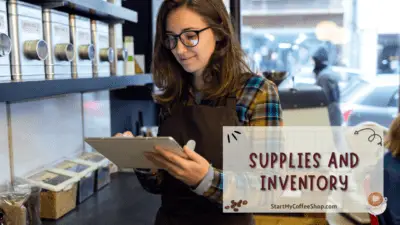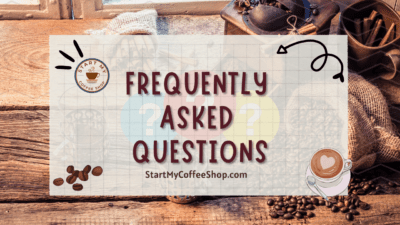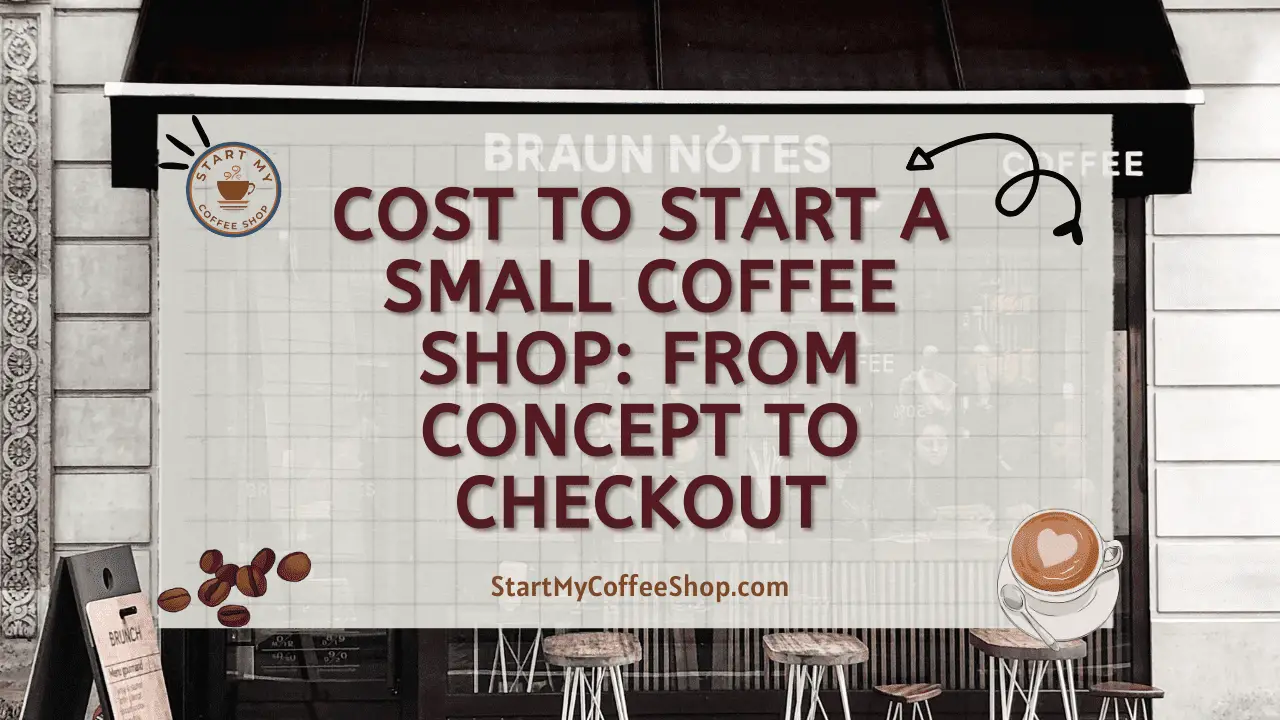Coffee shops have become popular gathering spots for people seeking a cozy ambiance, a quality caffeine fix, and a place to connect. If you’re an aspiring entrepreneur with a passion for coffee, starting a small coffee shop can be an exciting venture. However, like any business, it’s essential to understand the financial implications before diving in.
Starting costs for a small coffee shop can vary depending on factors like location, size, equipment, and permits. On average, you can expect to invest anywhere from $50,000 to $250,000 or more. With proper budgeting, you can launch a great coffee shop and caffeinate your way to profits.
In this article, I will explore the costs involved in starting a small coffee shop.
Location

Finding the perfect location for your coffee shop is paramount to its growth. The cost of a suitable location can fluctuate considerably, hinging on various factors such as the city, neighborhood, and the size of the space you require.
Prime locations in bustling urban areas tend to command higher lease or rental prices due to increased demand and visibility. On the other hand, smaller towns or less crowded areas might present more affordable options for budding entrepreneurs.
When assessing the cost of your ideal location, it’s crucial to consider factors beyond mere affordability. Foot traffic is a key consideration – a location with a steady flow of pedestrians passing by can potentially attract more customers. Accessibility is another aspect to ponder. Is the location easily reachable by public transportation? Is there ample parking available? These factors can impact the convenience of customers, influencing their decision to visit your coffee shop.
Moreover, it’s essential to evaluate the potential customer base in the vicinity. Are there nearby offices, residential areas, or educational institutions that can contribute to a consistent flow of customers throughout the day? Understanding the demographics and preferences of the local population can help you gauge the demand for your coffee offerings.
While cost is a significant factor in selecting a location, it shouldn’t be the sole deciding factor. Striking a balance between affordability, foot traffic, accessibility, and customer potential will help you find the optimal location for your coffee shop. Remember, a well-chosen location sets the stage for attracting and retaining customers, creating a strong foundation for your coffee shop’s progress.
Read more about:
Licensing and Permits
Operating a coffee shop entails navigating a maze of licensing and permit regulations. To ensure compliance, you’ll need to obtain a range of permits and licenses. These typically include business licenses, health department permits, and food handling permits. Additionally, if your coffee shop intends to serve alcoholic beverages, acquiring a liquor license is essential.
The costs associated with obtaining these licenses and permits can fluctuate based on your location and the specific requirements mandated by your local government. Each jurisdiction may have its own application fees, renewal fees, and inspection fees. It’s important to research and understand the licensing process in your area, as well as any associated costs, before opening your coffee shop.
Business licenses grant you the legal right to operate your coffee shop, ensuring compliance with local regulations and tax obligations. Health department permits to ensure that your establishment meets the required health and safety standards for food preparation and service. These permits often involve inspections and periodic renewal fees.
If you plan to serve alcohol, obtaining a liquor license is a separate process that involves additional fees and regulations. The costs associated with liquor licenses can vary significantly depending on factors such as your location and the type of license you require (e.g., beer and wine, full liquor license).
It’s important to budget for these licensing and permit costs as part of your overall financial plan for starting a coffee shop. Factor in the application fees, renewal fees, inspection fees, and any other expenses related to compliance. Consulting with local authorities or legal professionals can provide valuable guidance in navigating the licensing process and estimating the associated costs accurately.
Equipment and Furnishings:
When it comes to starting a coffee shop, investing in top-notch coffee-making equipment and creating a comfortable ambiance is paramount. High-quality equipment ensures the production of excellent coffee and helps establish your shop’s reputation.
The costs for essential equipment such as espresso machines, grinders, brewers, refrigerators, and display cases can vary widely, ranging from several thousand to tens of thousands of dollars depending on the brand, features, and capacity.
In addition to equipment, consider the cost of furnishing your coffee shop with seating, tables, lighting, and decor. Creating a welcoming and aesthetically pleasing environment is crucial for attracting and retaining customers. Comfortable seating arrangements, well-designed tables, and ambient lighting contribute to a pleasant atmosphere where customers can relax and enjoy their coffee. Allocating a portion of your budget for quality furnishings and decor will enhance the overall customer experience.
It’s essential to strike a balance between cost and quality when purchasing equipment and furnishings. Research different suppliers, compare prices, and read customer reviews to make informed decisions. Consider both the immediate costs and the long-term durability and performance of the equipment.
Furthermore, don’t overlook the importance of maintenance and repair costs for your coffee-making equipment. Regular servicing and upkeep ensure the longevity and smooth operation of your machines. Factor these ongoing expenses into your budget to maintain the quality and efficiency of your coffee-making equipment over time.
Supplies and Inventory

Running a coffee shop effectively requires a consistent supply of various consumables. Coffee beans, milk, syrups, sugar, cups, lids, napkins, and other items may seem insignificant on their own, but their cumulative cost can have a significant impact on your expenses over time.
To manage these costs effectively, it’s essential to establish strong relationships with local suppliers. Building a rapport with your suppliers can lead to better pricing agreements and potentially discounted rates. Local suppliers are often more flexible and responsive, allowing you to tailor your orders to your specific needs.
One effective strategy to reduce costs is purchasing in bulk. Buying larger quantities of coffee beans, milk, and other consumables can result in significant savings. Not only does bulk purchasing often come with discounted rates, but it also helps streamline your inventory management, reducing the frequency of ordering and potential delivery costs.
Regularly review your inventory to identify any wastage or areas where you can optimize usage. By minimizing waste and ensuring efficient consumption of consumables, you can maximize your cost savings.
Consider exploring different suppliers to compare prices and quality. While cost is a crucial factor, it’s equally important to maintain the quality of your ingredients and materials to deliver a consistent and enjoyable customer experience.
Read more about: Cost in Opening a Coffee Shop: Unveiling the Expenses
Staffing
Determining the appropriate staffing levels for your coffee shop is a critical aspect of its operation. It involves careful consideration of various expenses such as salaries, benefits, payroll taxes, and training costs. During the initial stages, you might find yourself taking on multiple roles or working with a small team to manage tasks and keep costs at a minimum.
As your business grows, you can gradually expand your workforce to meet the increasing demands. Hiring additional staff can alleviate your workload and provide better service to customers. Assess the different roles required, such as baristas, cashiers, kitchen staff, and cleaning personnel, based on your shop’s size and the range of services you offer.
When budgeting for staffing costs, consider the local labor market rates and legal requirements, including minimum wage laws and employment regulations. Factor in the cost of benefits, such as health insurance and paid time off, as they contribute to employee satisfaction and retention. It’s also important to account for payroll taxes, which include employer contributions to social security, unemployment insurance, and other relevant taxes.
Investing in proper training for your employees is crucial to maintain quality and consistency in your coffee shop. Allocate a portion of your budget for initial and ongoing training programs to ensure that your staff is well-equipped to deliver exceptional service.
Regularly assess your staffing needs and adjust accordingly based on business fluctuations and customer demand. Balancing costs while providing adequate staffing levels is key to running a great coffee shop. As your business expands, consider hiring strategically to optimize productivity and enhance the overall customer experience.
Marketing and Branding
Promoting your coffee shop is a crucial step in attracting customers and establishing your brand. Marketing and branding costs encompass various elements, including logo design, website creation, and the printing of menus, flyers, and other marketing materials.
Allocate a budget for online advertising, engaging social media campaigns, and participating in local community events to raise awareness about your coffee shop. Investing in effective marketing strategies helps to create a strong presence in the market and reach your target audience, ultimately driving customer engagement and boosting sales.
Utilities and Operational Expenses
Running a coffee shop entails managing ongoing operational costs, including electricity, water, heating, and cooling. These expenses can fluctuate depending on factors such as the size of your shop, the types of equipment used, and the utility rates in your area. It’s crucial to consider and include these costs when determining your coffee shop’s overall budget.
By accurately estimating and accounting for these operational expenses, you can ensure that your financial planning is comprehensive and sustainable, allowing you to effectively manage and control your coffee shop’s day-to-day operations.
Contingency Fund

When starting a business, it’s prudent to allocate a contingency fund to account for unforeseen expenses that may arise during the initial stages of your coffee shop’s operations. Unexpected costs can emerge, such as equipment repairs, unexpected maintenance, or sudden changes in regulations.
By setting aside a safety net, you can navigate these financial challenges without compromising the quality of your products or services. A contingency fund provides a buffer, ensuring that you have the necessary resources to address any unexpected financial hurdles that may arise.
It brings peace of mind and allows you to focus on delivering an exceptional coffee experience to your customers, knowing that you are prepared for any unforeseen circumstances that may arise along your entrepreneurial journey.
Read more about: Cost for Opening a Coffee Shop: The Financial Brew
Summary
Starting a small coffee shop can be an enjoyable venture, both personally and financially. While there are costs involved, careful planning and budgeting can help you launch your coffee shop effectively. Consider each aspect discussed in this article, and tailor your budget according to your specific needs and location.
Frequently Asked Questions

Q: Do I need a specific location for a coffee shop?
Ideally, you want a spot with high foot traffic, accessibility, and a target customer base. Consider factors like lease/rental costs and the potential for growth in the chosen area.
Q: What permits and licenses do I need to operate a coffee shop?
Typically, you’ll need a business license, health department permits, food handling permits, and possibly a liquor license if you serve alcohol.
Q: How much should I budget for coffee shop supplies and inventory?
It’s essential to factor in recurring costs for coffee beans, milk, syrups, cups, lids, and other consumables. Buying in bulk and establishing relationships with suppliers can help save costs.
To learn more on how to start your own coffee shop, check out my startup documents here.
Disclaimer: The information provided by StartMyCoffeeShop.com (“The Site”) is for general informational purposes only. All information on the Site is provided in good faith. However, we make no representation or warranty of any kind, express or implied, regarding the accuracy, adequacy, validity, reliability, availability, or completeness of any information on the Site. Under no circumstance shall we have any liability to you for any loss or damage of any kind incurred as a result of the use of the Site or Reliance on any information provided on the Site. Your use of the Site and reliance on any information on the Site is solely at your own risk. This blog post is for educational purposes only and does not constitute legal advice. Please consult a legal expert to address your specific needs. Terms and Conditions. (https://startmycoffeeshop.com/terms-and-conditions/)

Hi! I’m Shawn Chun
My adventure in coffee began when I first launched my first coffee shop back in the early 2000s. I had to figure out so many things on my own and to make it worse within 2 years of opening two large corporate coffee chains moved in just blocks away from me!
As I saw smaller and even some larger coffee shops in the neighborhood slowly lose customers to these giant coffee chains and slowly close up shop, I knew that I had to start getting creative…or go out of business.
I (like you may be) knew the coffee industry well. I could make the best latte art around and the foam on my caps was the fluffiest you have ever seen. I even had the best state-of-the-art 2 group digital Nuova Simonelli machine money could buy. But I knew that these things alone would not be enough to lure customers away from the name brand established coffee shops.
Eventually, through lots of trial and error as well as perseverance and creativity I did find a way to not only survive but also thrive in the coffee/espresso industry even while those corporate coffee chains stayed put. During those years I learned to adapt and always faced new challenges. It was not always easy, however, in the end, I was the sole survivor independent coffee shop within a 10-mile radius of my location. Just two corporate coffee chains and I were left after that year. All told the corporate coffee chains took down over 15 small independent coffee shops and kiosks and I was the last one standing and thriving.
Along the years I meet others with the same passion for coffee and I quickly learned that it is not only “how good a barista is” that makes a coffee shop successful, but the business side of coffee as well.
Hence why I started this website you are on now. To provide the tools and resources for up and coming coffee shop owners to gain that vital insight and knowledge on how to start a coffee shop successfully.
Stick around, browse through my helpful blog and resources and enjoy your stay! With lots of LATTE LOVE!
Shawn







